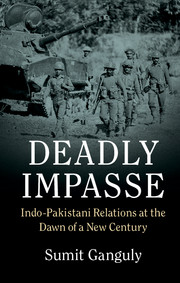Book contents
- Frontmatter
- Dedication
- Contents
- List of maps
- Preface and acknowledgments
- List of abbreviations
- 1 The rivalry revisited
- 2 Kargil and after
- 3 The troubled decade in Kashmir
- 4 The road to Operation Parakram
- 5 The composite dialogue and beyond
- 6 An extension of the rivalry
- 7 Policy implications
- In lieu of an epilogue
- Appendices
- References
- Index
3 - The troubled decade in Kashmir
Published online by Cambridge University Press: 05 March 2016
- Frontmatter
- Dedication
- Contents
- List of maps
- Preface and acknowledgments
- List of abbreviations
- 1 The rivalry revisited
- 2 Kargil and after
- 3 The troubled decade in Kashmir
- 4 The road to Operation Parakram
- 5 The composite dialogue and beyond
- 6 An extension of the rivalry
- 7 Policy implications
- In lieu of an epilogue
- Appendices
- References
- Index
Summary
THE CENTRALITY OF THE KASHMIR DISPUTE
Despite the failure to refocus international attention on the Kashmir issue through the incursions in Kargil and its vicinity, Pakistan's decision-makers remained unwilling to abandon their claims or dispense with the asymmetric war strategy that they had long relied upon to provoke India. The Pakistani security establishment composed of the uniformed military and the intelligence services, despite this latest setback, did not in any way abandon its commitment to keep the Kashmir question alive. On the contrary it simply renewed its efforts to sustain the military pressures on India through the use of a range of proxy forces. When faced with significant external pressures coupled with domestic turmoil the military establishment, especially under General Musharraf, engaged India in a dialogue. However, as this and the subsequent chapter will demonstrate, it is far from clear that Musharraf enjoyed the support of the country's sprawling security establishment. Consequently, even though the two parties arrived at a blueprint for embarking upon a process of rapprochement there is little or no evidence that Musharraf had succeeded in obtaining the assent of the military establishment. Without a clear-cut consensus within the military about a willingness to seek a rapprochement with India it is hard to imagine how the Pakistani state could have made a binding, credible commitment on such a fraught and vexed issue.
Of course, it is important to underscore that such a shift in views would be quite contrary to the organizational ethos and beliefs of the military establishment. Having been long committed to a policy of unrelenting hostility toward India, in the absence of some dramatic endogenous or exogenous shock to their status and interests it could not reasonably be expected to abandon long-held commitments. Of course, shocks alone were unlikely to lead to a new fundamental recalculation of the military's interests and proclivities. The shocks would also have to be accompanied with the prospect of an alternative set of governing arrangements. Such a moment did seem to arise in the aftermath of the 1971 East Pakistan crisis. However, Zulfikar Ali Bhutto, the president of Pakistan, squandered that opportunity to consolidate democratic institutions.
In the immediate aftermath of the Kargil War, with marked exceptions, the Pakistani security establishment remained quite prone to engage in various forms of myth-making to bolster its core strategic beliefs, especially to keep the Kashmir dispute alive at all costs.
- Type
- Chapter
- Information
- Deadly ImpasseIndo-Pakistani Relations at the Dawn of a New Century, pp. 53 - 62Publisher: Cambridge University PressPrint publication year: 2016

